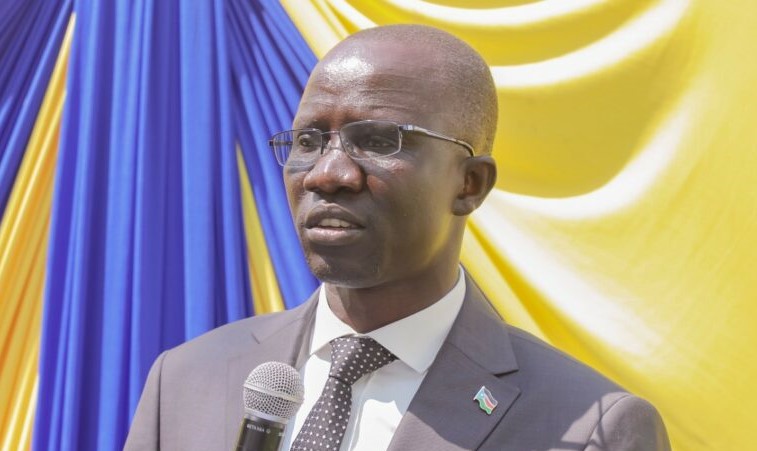By William Madouk
For thirteen years, the National Bureau of Statistics (NBS), has struggled to collect and distribute data on key indicators with significant gaps and challenges, which the institution attributes to funding constraints.
During a media briefing on the eve of African Statistics Day, NBS Director General Dr. Augustino Ting Mayai highlighted that inadequate funding has made it difficult for the agency to gather and distribute data effectively.
“As we celebrate this year’s ASD, our natural statistical system remains challenged. This is marked by limited resources, lack of statistics units across various institutions, poor record keeping, inadequate infrastructure and limited human resources capacity,” he lamented.
ASD is an annual event celebrated on the 18th of November each year; however, South Sudan could not celebrate this year’s ASD – due to other competing priorities, says Ting.
This year’s ASD theme is: “supporting education by modernizing production of fit-for-purpose statistics.”
According to Data experts, this is aligned with the African Union theme of educating and scaling Africa for the 21st century, which calls for modernizing data ecosystems in the continent for the production and utilization of high-quality official statistics, improving learning opportunities and quality for all children.
“In South Sudan, this statistics day is intended to ignite public debate that is aimed at building a culture of evidence-based policymaking or decision making, especially in the area of education,” the NBS boss noted.
He cited that a modernized data system helps South Sudan better understand its performance in education, including enrolment, attendance, completion, quality of learning, access, equity and resources required for purposive learning.
He stated that persistent conflict hampered the Bureau of Statistics in carrying out its mandate.
“Over the years, there have been challenges for us to realize all the objectives for which the Bureau was set up,” he stated.
“One of the factors that has led to that is the conflict in the country, diverting resources away from development. And as a result, we have had limited effort at producing the statistics,” he added.
Reforms.
Mr. Ting revealed that his docket has partnered with various global institutions, including UNFPA, UNDP, FAO, the World Bank and the ministry of finance to promote evidence-based decision-making that impacts educational reforms and fosters data-driven development planning in South Sudan.
According to him, with relative peace in the country, National Bureau of Statistics is now undertaking key steps to realize good data collection that will be disseminated to the public.
“Number one is to build a statistical system nationwide and this is under what is known NSDS-2 and that’s basically the development statistics in the country – and this covers all the data producing, data users in the country,” he revealed.
“Secondly, we are working on a repository – a repository in this case is a place where, it’s a stop-center where you can go for dashboards, where you can go for all statistics,” Ting continued.
Dr. Ting underscored that the NBS teams are working hard and lobbying resources from UN agencies to ensure that the IT system is built to provide a stronger repository for disseminating data.
“We now have a server, it’s under the Migration and Demography Department, there are a couple of efforts that are being undertaken to make sure that the information is made available,”
Access to information
NBS Boss noted that there is good data, however, access to that information remains a big challenge.
“The Ministry of Education actually has good data; the problem is what you just cited is access to that information,” he said.
“I know that there’s information and that’s why we’re trying to build a repository. So, all of this information is anonymized – then identities of students and teachers are removed and have general information,” he added.
“So, we’re working very closely with different institutions to make the data more available and improve the quality of those data,” Ting stated.
Ongoing projects
Despite financial constraints, Dr. Ting said his docket is undertaking several efforts with partners.
“Right now, we are undertaking what we call Multiple Indicator Cluster Survey (MIPS), and it’s covered by UNICEF and the World Bank,” he said.
He stated this is a large-scale study – that would provide more information, especially on children and women in the country, including their well-being.
“And then we’re undertaking another study – it’s an economic study – it’s called the Household Budget Survey,” Mr. Ting said.
To him, the study covered by the African Development Bank and UNDP would help NBS to understand the socioeconomic conditions of the population and the poverty line in the country.
“The Household Budget Survey will be the first of its kind since 2009. This is the first time we’ll have right after independence – and so we are undertaking efforts right now in order to produce new data.
Because the data we had back in 2006, eight, nine, and even 2010 are not, they’re useful, they’re a point of departure for us policy-wise, but they don’t point to the more recent conditions of the population, he said.
“We are also scheduled to undertake Labor Force and Migration Survey; it’s funded by the International Labor Organization (ILO). We have a number of projects that are being undertaken at a medium-scale level,” he continued.
Mr. Ting highlighted that UNFPA is providing resources for maternal mortality survey, stating that “these are studies that provide really good data for the country.”
“We do have some survey data that we’ve done some years back. And you see populations not remain the same all the time. Increasing, increasing others are going, others are coming.”



